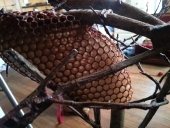












Moderator, Treatment Free Beekeepers group on Facebook.
https://www.facebook.com/groups/treatmentfreebeekeepers/









Quintin
 1
1




Chris Badgett
Cocreator of Organic Life Guru. Have you seen what's happening over there?




Quintin Holmberg wrote:Honey bees travel up to a mile to forage.
find religion! church
kiva! hyvä! iloinen! pikkumaatila
get stung! beehives
be hospitable! host-a-hive
be antisocial! facespace




Chris Badgett wrote:Try reaching out to Ross Conrad. We just created an online Apitherapy course with him over at Organic Life Guru. He's very knowledgeable about colony collapse. Here's his website: Dancing Bee Gardens





Conventional beekeepers lose 40% of their bees annually to ccd. Organic beekeepers lose 5-10%. Permaculture beekeepers rarely lose hives when they follow these techniques.
My project thread
Agriculture collects solar energy two-dimensionally; but silviculture collects it three dimensionally.





find religion! church
kiva! hyvä! iloinen! pikkumaatila
get stung! beehives
be hospitable! host-a-hive
be antisocial! facespace




My project thread
Agriculture collects solar energy two-dimensionally; but silviculture collects it three dimensionally.




Cj Verde wrote:According to Paul's 6 of diamonds,
Conventional beekeepers lose 40% of their bees annually to ccd. Organic beekeepers lose 5-10%. Permaculture beekeepers rarely lose hives when they follow these techniques.
That doesn't match my experience. I attended the 2013 West Coast Treatment-free Beekeeping Conference and *everybody* was reporting losses far exceeding 5-10%. Unless we are talking *only* CCD - in that case I agree, that is rare in natural beekeeping.
















Ludger Merkens wrote:Hi,
if you are talking about CCD, what symptoms are you exactly talking about? I know hive losses from varroa mites infection, from nosema also, but I probably couldn't tell CCD from a varoa mites infection apart.
Independently of the exact symptoms of CCD. It seems obvious to me, that healthy, diverse, non poisenous forage, with full honey storage above the bees all year, is a good starting point to reduce colony losses.

|
This is my favorite tiny ad:
physical copy of the SKIP book
https://permies.com/wiki/160690/physical-copy-SKIP-book
|




